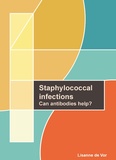Staphylococcal infections
Can antibodies help?

Vor, Lisanne de
- Promoter:
- Prof.dr S.H.M. (Suzan) Rooijakkers
- Co-promoter:
- Dr C.P.M. (Kok) van Kessel
- Date:
- November 4, 2022
- Time:
- 10:15 h
Summary
Staphylococci (in particular S. aureus and S. epidermidis) are human pathogens that can cause a wide range of infections, including skin infections, sepsis, and implant related infections. Due to the emergence of multidrug resistant strains, effective antibiotic treatment of staphylococcal infections becomes increasingly complicated. Treatment is also complicated because of staphylococcus’ ability to form biofilm on medical implants. In the biofilm environment, bacteria are protected from antimicrobial therapy and the immune system. It has been difficult to find new antibiotics that act on multi resistant strains and biofilm, and there is a clear need for the development of alternative therapies. Monoclonal antibodies (mAbs) are a promising alternative because they are specific, safe, and easy to engineer. The research presented in this thesis focused on the engineering of mAbs for the use against S. aureus and S. epidermidis in single cell and biofilm form.
In Chapter 2 we show that mAbs recognizing common surface components of S. aureus can bind clinically relevant biofilm types. In Chapter 3, we produced biofilm specific mAbs conjugated to biofilm degrading enzymes DNAse I and Dispersin B and characterized their anti-biofilm functionality in vitro. In Chapter 4, we studied the potential of immune activating mAbs against S. aureus to induce phagocytic killing by human neutrophils. We show that phagocytic killing is completely dependent on complement activation and that phagocytic killing could be enhanced by engineering the mAbs’ Fc-tail. In Chapter 5 we studied the role of phagocytic receptors (Fc-gamma receptors and complement receptors) in the uptake of bacteria by human neutrophils, and we describe that antibody mediated activation of the complement system reduces the ability of a mAbs’ Fc-tail to interact with Fc receptors. In conclusion, the results presented in this thesis provide fundamental insights that are crucial for the development of antibody therapeutics for staphylococcal infections.